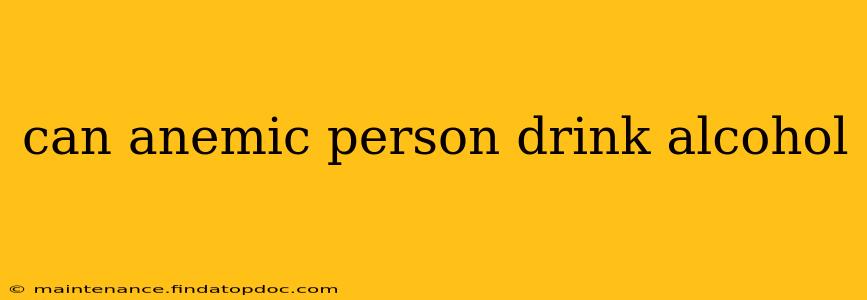Can an Anemic Person Drink Alcohol? Navigating Alcohol Consumption with Anemia
Anemia, characterized by a deficiency of red blood cells or hemoglobin, can leave you feeling fatigued, weak, and short of breath. If you have anemia, you might be wondering about the impact of alcohol on your condition. The short answer is: it's generally not recommended to drink alcohol if you have anemia. Let's delve into the reasons why.
How Does Alcohol Affect Anemia?
Alcohol interferes with several crucial processes involved in managing and treating anemia:
-
Nutrient Absorption: Alcohol can impair the absorption of essential nutrients like iron, folate, and vitamin B12 – all vital for red blood cell production. A deficiency in these nutrients can worsen existing anemia or even trigger it. Since individuals with anemia already struggle with nutrient deficiencies, adding alcohol further compromises their body's ability to replenish these crucial elements.
-
Liver Function: The liver plays a significant role in the metabolism of iron and the production of red blood cells. Excessive alcohol consumption can damage the liver, hindering its ability to perform these essential functions and potentially exacerbating anemia.
-
Dehydration: Alcohol is a diuretic, meaning it increases urination and can lead to dehydration. Dehydration can further complicate anemia, as it thickens the blood, making it harder for the already reduced number of red blood cells to circulate efficiently.
-
Increased Risk of Bleeding: Alcohol can increase the risk of gastrointestinal bleeding, which can worsen anemia by causing further blood loss.
-
Medication Interactions: Many individuals with anemia require medication, such as iron supplements. Alcohol can interact with these medications, reducing their effectiveness or causing adverse side effects.
What Types of Anemia Are Particularly Affected by Alcohol?
While the negative impacts of alcohol are relevant across various anemia types, some are particularly sensitive:
-
Iron-Deficiency Anemia: This is the most common type of anemia, characterized by a lack of iron in the body. Alcohol directly interferes with iron absorption, making this type of anemia worse.
-
Folate Deficiency Anemia: Folate is crucial for red blood cell production. Alcohol consumption hinders folate absorption, potentially worsening folate deficiency anemia.
-
Vitamin B12 Deficiency Anemia: Similar to folate, vitamin B12 is essential for red blood cell formation. Alcohol consumption can negatively impact vitamin B12 absorption and contribute to deficiency.
Can I Drink Alcohol Occasionally if I Have Anemia?
Even occasional alcohol consumption can still negatively impact nutrient absorption and liver function in individuals with anemia. It's generally advisable to completely avoid alcohol if you have anemia, especially if you are undergoing treatment. If you are concerned about alcohol consumption and its potential impact on your specific type of anemia, you should consult your doctor or hematologist. They can advise on an appropriate course of action based on your individual health profile.
What Should I Do if I Have Anemia?
Focus on these key strategies to manage your anemia:
-
Consult a Doctor: A thorough diagnosis and a personalized treatment plan are crucial.
-
Dietary Changes: Incorporate iron-rich foods, such as red meat, leafy greens, and beans, into your diet.
-
Supplements: Your doctor might recommend iron, folate, or vitamin B12 supplements.
-
Lifestyle Changes: Maintain a healthy lifestyle that includes regular exercise and sufficient sleep.
What if I Already Drink Alcohol and Have Anemia?
If you have anemia and currently consume alcohol, it's essential to discuss this with your doctor immediately. They can help you develop a plan to reduce or eliminate alcohol consumption while effectively managing your anemia.
This information is for general knowledge and does not constitute medical advice. Always consult your doctor or a qualified healthcare professional for any health concerns or before making any decisions related to your health or treatment.
